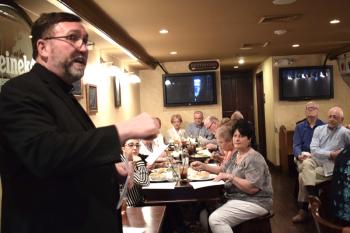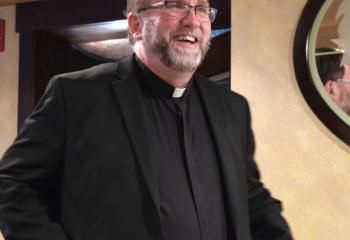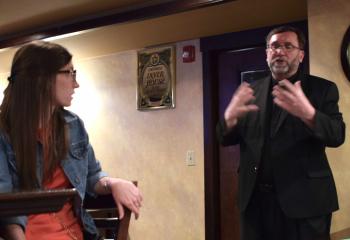By TARA CONNOLLY
Staff writer
“Ignatian spirituality is rooted in the experiences of St. Ignatius Loyola, a Basque aristocrat whose conversion to a fervent Christian faith began while he was recovering from war injuries,” said Father Christopher Walsh, pastor of St. Raymond, Philadelphia during “Faith and Spirits” at Braveheart Highland Pub, Hellertown.
Father Walsh directed the casual conversation “St. Ignatius of Loyola and Discernment of Spirits” May 6 with more than 40 adults.
“Ignatian spirituality for everyday life. It insists that God is present in our world and active in our lives. It is a pathway to deeper prayers, good decisions guided by discernment and a life of service to others,” he told the faithful.
Father Walsh began the discussion with St. Ignatius’ wealthy background and a life-changing injury he endured when he was hit with artillery, similar to a cannon ball, during a battle against the French.
During his recuperation, Ignatius read nearly all the books in his family’s castle to pass the time. After running out of reading material, he read the Bible and “Lives of the Saints.”
“God used his vanity and desire to ‘look good.’ Ignatius purposely avoided those two books until there was nothing left to read,” said Father Walsh.
After reading the Bible and “Lives of the Saints,” Father Walsh said, Ignatius experienced movements in his heart and was attracted to the saints and the Word of God.
“It was at this time that he began to think about becoming a soldier for Christ,” he said.
When he recovered, Ignatius left his home, made an all-night vigil in a church before the Blessed Virgin and left his sword at her feet.
He then set out for Manresa, spent the first three days making a general confession of his whole life and remained there in a cave for over eight months. In those eight months, Ignatius underwent severe trials, fought bitter temptations and received extraordinary graces that resulted in the first draft of the famous “Spiritual Exercises of St. Ignatius.”
Next, he studied theology in Paris and became roommates with St. Francis Xavier and St. Peter Faber. They eventually formed the Society of Jesus together.
“That is a huge moment in history. I don’t think the world will ever see three college roommates all become saints,” joked Father Walsh.
Ignatius, Francis and Peter formed “companion friends of Jesus” while contemplating their future in Rome. They eventually decided to form a religious order under a vow of obedience to a superior, Ignatius. The companions, soon to be called Jesuits, vowed to go wherever the Church’s needs were the greatest and wherever they could help the most souls.
“Ignatius never leaves Rome. Instead, he writes the core of Ignatian spirituality – the ‘Spiritual Exercises of Ignatius of Loyola,’” said Father Walsh.
Composed between 1522 and 1524, the exercises are a set of Christian meditations, contemplations and prayers. They are divided into four thematic “weeks” of variable length and are designed to be carried out over 28 to 30 days.
The exercises were composed to help participants in religious retreats discern the will of God in their lives, leading to a personal commitment to follow Jesus whatever the cost.
“If you can do it – it will change your life forever. But most people can’t get away for 30 days,” said Father Walsh.
“But that doesn’t mean that God does not desire you. God is longing for you. He never forces himself on anyone. He waits for you to be free,” he said.
Like Ignatius, Father Walsh said, it is critical for people to pay attention to the interior movements in their hearts.
“Some movements are led by the good spirit, which is God. Others are led by the evil spirit, which is the devil. Ignatius would say to flee from the evil spirit. If you can defeat the devil head on – then do it. But if you can’t – move away,” he said.
When experiencing movements of the heart, Father Walsh said, Ignatian spirituality contends that a person is always in a state of consolation or desolation.
“Each one of you have experienced spiritual consolation. When we are in consolation – we are more willing to love others. The basic rule of Ignatius is – ‘only make big decisions when you are in spiritual consolation,’” he said.
Father Walsh said Ignatian spirituality maintains “spiritual consolation” is an experience of being so on fire with God’s love that people feel impelled to praise, love and serve God, and help others as best as they can.
In contrast, “spiritual desolation” is an experience of the soul in heavy darkness or turmoil. Ignatian spirituality describes this state as being in doubt, bombarded by temptations and mired in self-preoccupations.
He pointed out that people enter “spiritual desolation” when they choose sin or become too busy to make time for prayer.
“The Spiritual Exercises helps you realize what kind of sin has a hold on your life. Maybe your prayer isn’t working,” said Father Walsh.
“Sometimes, we need to change it up, get more rest and pray in a different way.”










